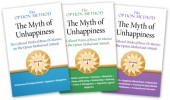Comparative Consistency/Prerequisite Preparation
In this talk from the 1973 Monday Night Study Group, Bruce Di Marsico discusses more about how we judge how unhappy to be, and what we want more between two things.
“Comparative Consistency” is deciding the degree of unhappiness for an event in proportion to how unhappy we feel about a similar event. For example, if we lose $20, we will be unhappier if we lose $100, and even more unhappy if we lose $1000.
“Prerequisite Preparation” is deciding between two desires proportionate to which seems better preparation for the rest of my life. For example, if we both want spend more time exercising, and want to spend more time making money, if we are not confused by unhappiness, we will decide between the two based on which we predict will be better preparation for our future.
Since we presume that others use unhappiness as we do, we often use the threat of unhappiness to motivate others. For example, if we know that a employee is afraid of disapproval, we may act disapproving so that the employee is motivated by their unhappiness at being disapproved of.
Option Method – Comparative Consistency

